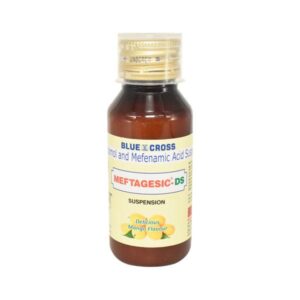PARACETAMOL + MEFENAMIC ACID
Paracetamol: Paracetamol, also known as acetaminophen, is a commonly used over-the-counter pain reliever and fever reducer. It is a non-opioid analgesic that provides relief from mild to moderate pain.
Paracetamol works by inhibiting the synthesis of prostaglandins, which are chemical messengers involved in pain and inflammation. By reducing the production of these compounds, it helps to alleviate pain and reduce fever.
Paracetamol is used to treat various conditions, including headaches, toothaches, muscle aches, backaches, and fever associated with common colds and flu. It is also used in combination with other medications to provide relief from more severe pain, such as post-operative pain or pain caused by chronic conditions like arthritis.
The recommended dose of Paracetamol for adults and children over 12 years of age is usually 325-1000 mg every 4-6 hours, with a maximum daily dose of 4000 mg. For children between the ages of 2 and 12, the dose is based on their weight. It is important to follow the instructions on the packaging or as advised by a healthcare professional to ensure proper dosing.
While Paracetamol is generally considered safe when used as directed, it can have side effects in some individuals. Common side effects may include nausea, vomiting, stomach pain, and rash. Liver toxicity can occur if the drug is taken in excessive doses or with alcohol, or in individuals with underlying liver conditions. Allergic reactions to Paracetamol are rare but can occur.
It is important to be cautious when taking Paracetamol in combination with other medications, as it can be found in many over-the-counter and prescription products. This can lead to accidental overdose, so it is crucial to read labels carefully and consult a healthcare professional if unsure.
As with any medication, it is recommended to consult a healthcare professional before taking Paracetamol, especially if you have any pre-existing medical conditions or are taking other medications. They can provide guidance on the appropriate dose and ensure its safe use.
Mefenamic Acid: Mefenamic Acid is a nonsteroidal anti-inflammatory drug (NSAID) that is commonly used for the treatment of pain, inflammation, and fever. It is available in various forms such as tablets and capsules.
The mechanism of action of Mefenamic Acid involves inhibiting the production of certain chemicals in the body called prostaglandins. Prostaglandins are responsible for pain, inflammation, and fever. By inhibiting their production, Mefenamic Acid helps to reduce these symptoms.
The recommended dose of Mefenamic Acid may vary depending on the condition being treated. For pain and inflammation, the usual adult dose is 250 mg taken orally three to four times a day. However, it is always important to follow the specific dosing instructions provided by your healthcare provider.
Like other NSAIDs, Mefenamic Acid may cause side effects. The most common side effects include stomach pain, heartburn, nausea, vomiting, diarrhea, constipation, and headache. It may also cause more serious side effects such as stomach ulcers, bleeding, kidney problems, and allergic reactions. It is important to promptly report any severe or persistent side effects to your healthcare provider.
As with any medication, it is essential to use Mefenamic Acid under the guidance of a healthcare professional. They can evaluate your individual circumstances and medical history to determine if this drug is suitable for you.

